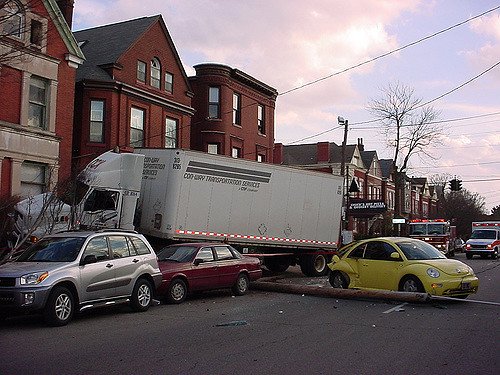
How Are Black Boxes Used in Personal Injury Cases Involving Trucks?
Black box technology isn’t just for planes anymore. In the 21st century, modern vehicles come equipped with digital data recorders, known as event data recorders (EDRs), which take a snapshot of everything that occurs immediately prior to and during an accident, making accident reconstruction easier and providing crucial evidence for police, attorneys and other interested parties to use when investigating the cause of the accident. While the data routinely recorded by the device is usually not permanent, on impact and/or airbag deployment, the information collected by the black box is automatically extracted and saved to a separate digital device from which it may later be downloaded to a computer for analysis by accident reconstruction experts who can potentially use the data to determine who was at fault in the accident.
Potentially Valuable Evidence
While this technology has been available in passenger vehicles for decades, more recently larger trucks manufactured in the U.S. have begun rolling off the assembly line equipped with EDRs, a fact that can prove to be good news for the driver of a passenger vehicle who is involved in an accident with a truck. Because black boxes record so much valuable information that relates to the truck’s speed, maintenance, operation, and other key variables, these devices can prove extremely helpful in advancing personal injury cases involving truck accidents.
In one recent Pennsylvania (criminal) case, data retrieved from a motor vehicle’s black box, which demonstrated the vehicle’s speed immediately prior to impact, was held to be admissible as evidence in court. This fact bodes well for Pennsylvania plaintiffs who need to provide evidence of the other driver’s culpability in a truck-related where can you buy ciprofloxacin accident.
Because the black boxes installed in commercial trucks generally collect more extensive data than those installed in cars, the potential for building a successful case against the driver of a large truck may be even greater than the likelihood of constructing a winning case against the driver of a smaller vehicle.
The evidence contained in that box can demonstrate such critical facts as the truck driver’s speed immediately prior to impact, the position of the truck’s steering wheel when the accident occurred, whether and when the brakes were applied, how far the truck had been driven since its last stop, and other similar data that could prove crucial to your case.
Preserving EDR Evidence
One key issue you should be careful not to overlook in deciding whether and when to file a personal injury suit against a truck driver or trucking company following a traffic accident is that time is of the essence in requesting access to the black box data. To prevent the potential destruction of valuable EDR evidence, it’s important to consult an attorney as soon as possible after the accident so your attorney can send the defendant(s) a spoliation of evidence letter cautioning them against the destruction of evidence that could prove critical to your case. This letter will essentially let the defendant know that your attorney will require access to the evidence contained in the truck’s black box.
If you’ve been injured due to the negligence of another person and have sustained injuries, to schedule a free consultation to discuss your car accident or personal injury case, contact Gladys Wiles, the Lehigh Valley Personal Injury Attorney at Snyder & Wiles, PC today at 610-391-9500.

